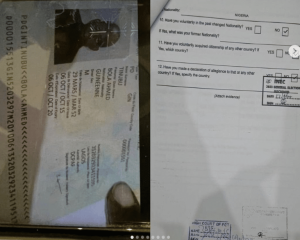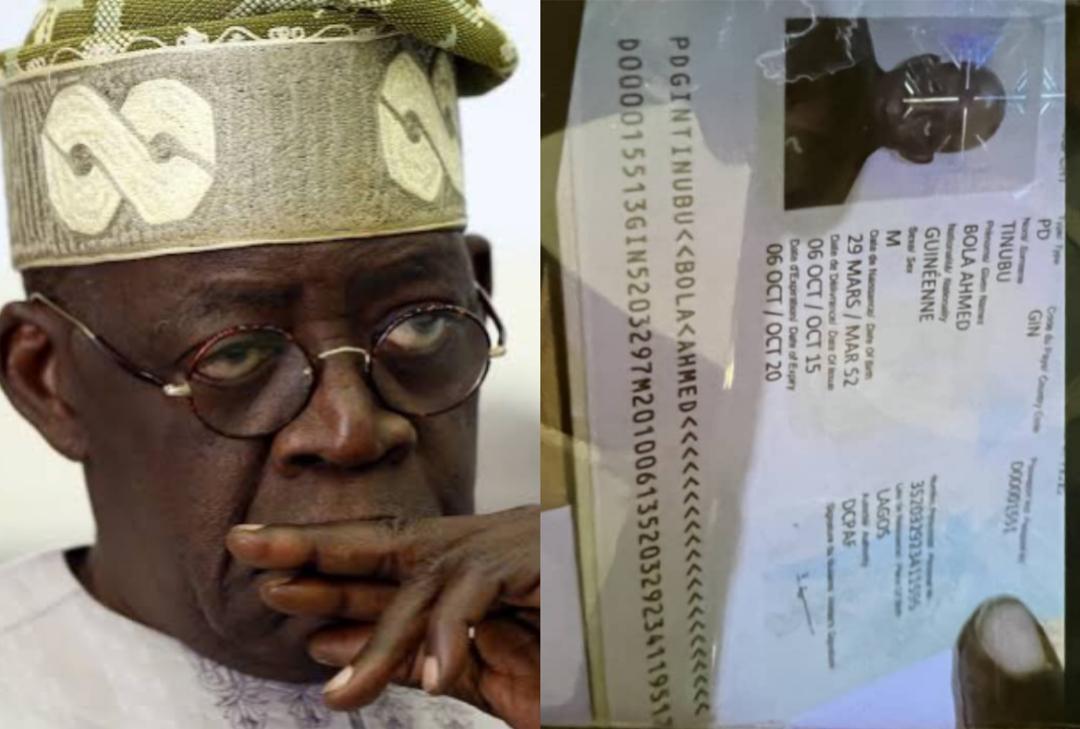Following the viral report alleging the President-elect, Asiwaju Bola Ahmed Tinubu, holds a Guinea Conakry diplomatic passport and by so doing, holds a dual citizenship or nationality, NigeriaCheck Newspaper carried out a check on the position of the Nigerian Constitution on this, and discovered the following:
That the only place the Constitution, talks about forfeiture of citizenship or nationality, is in Chapter 3, Section 28, Sub-section 1, which says, “Subject to the other provisions of this section, a person shall forfeit forthwith his Nigerian citizenship if, not being a citizen of Nigeria by birth, he acquires or retains the citizenship or nationality of a country, other than Nigeria, of which he is not a citizen by birth.
This means a Nigerian citizen by birth is allowed by this provision of the Constitution to acquire or retain the citizenship or nationality of another country, other than Nigeria without any consequences.
This also means that the forfeiture only applies to persons, who are not Nigerian citizens by birth, and still went on to hold the citizenship or nationality of another country other than Nigeria.
In other words, this indicates that Nigeria allows dual nationality or citizenship for most persons, but does not allow persons, who have been naturalised in another country to naturalise as Nigerians.

It also follows that nationals of origin in Nigeria or another country are allowed to naturalise without renouncing other nationality.
The other issue that NigeriaCheck Newspaper considered during its search is voluntary renounciation of one’s citizenship or nationality for another.
The question here, is whether the President-elect had at any point in the past voluntarily renounced his Nigerian citizenship to attain that of another?
During our search, we discovered that Chapter 3, Section 29, Sub-section 1 of the Constitution says; “Any citizen of Nigeria of full age, who wishes to renounce his Nigerian citizenship shall make a declaration in the prescribed manner for the renunciation.”
Further, Sub-section 2 says, “The President shall cause the declaration made under subsection (1) of this section to be registered and upon such registration, the person, who made the declaration shall cease to be a citizen of Nigeria.”
This shows that there is a voluntary citizenship as well as involuntary nationality, which in other words means situational cases such as political fugitives, political asylum seekers and as a result of war, and they are usually given diplomatic passports.
But voluntary naturalization in another country is considered as “giving up” of one’s previous citizenship or implicit renunciation. This obviously is not usually and practically an automatic individual decision as renunciation cannot officially take place until the authorities of the original country are informed about the naturalization. It follows that to voluntarily become a citizenship of another country, one must at a point voluntarily renounced his country’s citizenship or nationality to attain that of another.
In the case of the President-elect there are no records or references of registration/declaration, as stipulated by the Constitution, to that effect.
By this, one now understands why the word “voluntarily” was included in Question No. 10, of the Independent National Electoral Commission, INEC’s form, which reads, “Have you voluntarily in the past changed nationality?” And equally explains why the President-elect answered in the negative with a capital, No.
If this is understood, the question Nigerians should be concerned about now is whether the Nigeria Constitution allows public office holders, those in the government or a person seeking elective office to hold dual citizenship or nationality?
On this, NigeriaCheck News gathered that the Constitution, Chapter 3, which talks mainly about Citizenship, was silent on whether members of the government or public office holders, such as the President, Governor, or State and National Assembly members can hold a dual nationality.
But Section 137, Sub-section (1) of the Constitution says “A person shall not be qualified for election to the office of President if –
“(a) subject to the provisions of Section 28 of this Constitution, he has voluntarily acquired the citizenship of a country other than Nigeria or, except in such cases as may be prescribed by the National Assembly, he has made a declaration of allegiance to such other country; or
“(b) he has been elected to such office at any two previous elections; or
“(c) under the law in any part of Nigeria, he is adjudged to be a lunatic or otherwise declared to be of unsound mind.”
It follows that one is at liberty to assert that if a Nigerian citizen by birth is allowed by the provision of Chapter 3, Section 28, Sub-section 1 of the Constitution to acquire or retain the citizenship or nationality of another country, other than Nigeria without any consequences, it means that any public office holder or member of the government, who is a Nigerian citizen by birth, is automatically allowed to hold a dual citizenship or nationality since there is no caveat in the constitution that says otherwise.
However, NigeriaCheck Newspaper believes that since the Constitution is specific that a person shall not be qualified for election to the office of President, if he has “voluntarily” acquired the citizenship or nationality of a country other than Nigeria, Nigerians, seeking the disqualification of Asiwaju based on his dual citizenship, will now have to prove in the law Court on whether the President-elect acquired the Guinea Conakry passport voluntarily or involuntarily.
But for the meantime, the assertion that the President-elect, Asiwaju Bola Ahmed Tinubu, is automatically disqualified for holding a Guinea Conakry passport is untrue and misleading.

